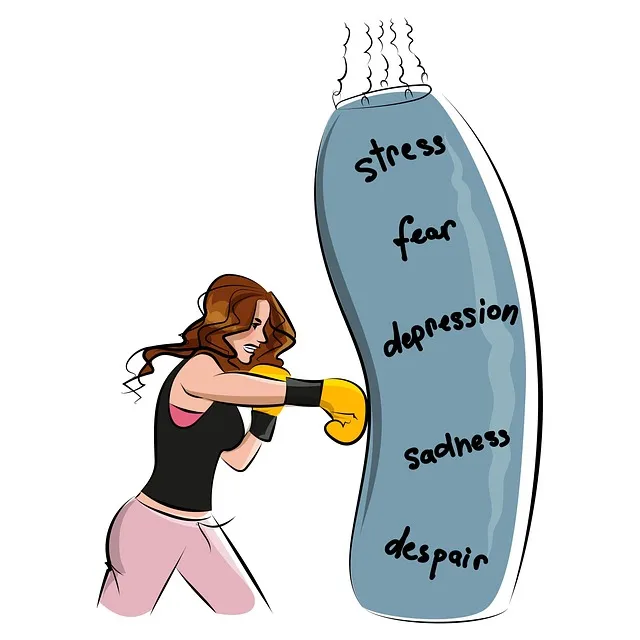Early recognition of depression signs through Kaiser Permanente's holistic approach prevents episodes. This involves lifestyle changes like exercise, balanced diets, and mindfulness, plus professional support for therapy, coping skills, and mental wellness coaching at their Centennial center. Building resilience through self-care and social support strengthens one's ability to adapt positively to challenges, maintaining mental health.
Depression is a serious yet treatable condition, and implementing proactive strategies can be life-changing. This comprehensive guide from the Kaiser Permanente Mental Health Access Center in Centennial explores essential tools for prevention. From recognizing subtle early signs to adopting beneficial lifestyle changes, this article equips readers with knowledge to foster mental well-being. Additionally, it highlights the importance of professional support and offers valuable coping mechanisms for building resilience. Take control of your mental health journey with these effective strategies.
- Recognizing Early Signs and Symptoms
- Lifestyle Changes for Mental Well-being
- Seeking Professional Help and Support
- Building Resilience and Coping Strategies
Recognizing Early Signs and Symptoms

Recognizing the early signs and symptoms of depression is a vital step in prevention. According to the Kaiser Permanente Mental Health Access Center Centennial, individuals often experience subtle changes in their mood, energy levels, and thoughts before a major depressive episode sets in. These initial indicators might include persistent feelings of sadness, loss of interest in activities once enjoyed, changes in appetite or sleep patterns, fatigue, difficulty concentrating, and even recurring thoughts of death or suicide.
If you or someone close to you is experiencing these symptoms, it’s crucial to seek professional help. The Kaiser Permanente Mental Health Access Center Centennial offers valuable resources and services, including risk assessments for mental health professionals, social skills training, and confidence-boosting programs. Early intervention can make a significant difference in managing and preventing depression, ensuring individuals have the tools and support needed to lead fulfilling lives.
Lifestyle Changes for Mental Well-being

At the Kaiser Permanente Mental Health Access Center in Centennial, we understand that preventing depression involves a holistic approach to mental well-being. Lifestyle changes play a significant role in maintaining and enhancing one’s mental health. Incorporating regular exercise, a balanced diet, and sufficient sleep into daily routines can significantly reduce the risk of depressive episodes. These foundational habits not only support overall physical health but also create a stable environment for the mind to thrive.
Additionally, engaging in practices like mindfulness meditation has been shown to be effective in preventing depression. Mindfulness Meditation techniques, as part of our Mental Health Education Programs Design, teach individuals to stay present and cultivate awareness without judgment. This proactive approach empowers people to manage stress, regulate emotions, and foster resilience—essential components in the prevention strategy for mental health professionals and their clients alike. Moreover, Risk Management Planning for Mental Health Professionals can benefit from these lifestyle changes, ensuring they are equipped to provide optimal care while maintaining their own well-being.
Seeking Professional Help and Support

Depression can be a challenging and isolating experience, but seeking professional help is an essential step towards recovery. The Kaiser Permanente Mental Health Access Center in Centennial offers comprehensive support for individuals struggling with mental health concerns. Their team of skilled professionals provides various therapy options, including individual counseling, group therapy, and specialized programs tailored to address specific needs.
Effective communication strategies, coping skills development, and mental wellness coaching programs are among the resources available. These initiatives empower individuals to manage their symptoms, build resilience, and improve overall mental wellness. By leveraging these support systems, one can navigate their journey towards a brighter, healthier mindset.
Building Resilience and Coping Strategies

Building resilience and developing effective coping strategies are key components in preventing depression, as highlighted by experts at the Kaiser Permanente Mental Health Access Center Centennial. Resilience is defined as the ability to adapt positively to challenging situations, and it plays a significant role in navigating life’s stressors. By fostering inner strength development, individuals can enhance their mental wellness and better cope with adversity.
The center emphasizes that resilience isn’t something we’re born with; rather, it’s developed over time through various practices. Engaging in regular physical activity, cultivating mindfulness, and practicing self-care are all part of building resilience. These strategies help to regulate emotions, reduce stress, and promote a sense of calm, which are essential for maintaining mental wellness. Additionally, seeking support from friends, family, or professional therapists can provide valuable coping tools and strengthen one’s inner resources.
Preventing depression involves a multi-faceted approach, as highlighted by the resources available at the Kaiser Permanente Mental Health Access Center in Centennial. By recognizing early signs, adopting healthy lifestyle changes, seeking professional help, and building resilience, individuals can effectively navigate and overcome challenges related to mental well-being. These strategies empower individuals to lead more balanced and fulfilling lives.






